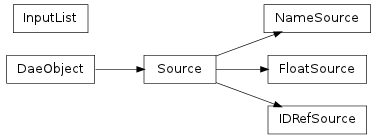collada.source.FloatSource¶
- class collada.source.FloatSource(id, data, components, xmlnode=None)¶
Bases: collada.source.Source
Contains a source array of floats, as defined in the collada <float_array> inside a <source>.
If f is an instance of collada.source.FloatSource, then len(f) is the length of the shaped source. len(f)*len(f.components) would give you the number of values in the source. f[i] is the ith item in the source array.

- __init__(id, data, components, xmlnode=None)¶
Create a float source instance.
Parameters: - id (str) – A unique string identifier for the source
- data (numpy.array) – Numpy array (unshaped) with the source values
- components (tuple) – Tuple of strings describing the semantic of the data, e.g. ('X','Y','Z') would cause data to be reshaped as (-1, 3)
- xmlnode – When loaded, the xmlnode it comes from.
Methods
__init__(id, data, components[, xmlnode]) Create a float source instance. load(collada, localscope, node) save() Saves the source back to xmlnode - id¶
The unique string identifier for the source
- data¶
Numpy array with the source values. This will be shaped as (-1,N) where N = len(self.components)
- components¶
Tuple of strings describing the semantic of the data, e.g. ('X','Y','Z')
- xmlnode¶
ElementTree representation of the source.